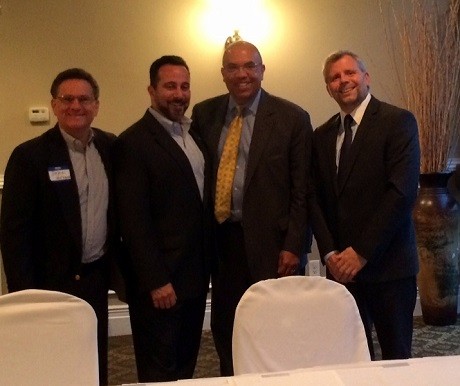Panelists Give Job Hunting, Career Advice to IT Professionals at AITP NJ Meeting

The AITP NJ Panel on careers. | Esther Surden
Job hunting and career advice were the topics discussed at the June meeting of the Association of Information Technology Professionals New Jersey Chapter.
Panelists Dean Hoffman, a senior recruiter for Carter McKenzie (Pine Brook); Rod Colon, career coach and podcaster at Own Your Own Career; and Rick Carney, CIO for TRAC Intermodal (Princeton), shared their insights with some 50 attendees. Moderating the panel was Chris Ciulla, regional vice president for the northeast at the staffing firm Modis (Woodbridge).
Some key points:
- The job market for IT professionals is evolving. Hoffman said that there has been a tremendous change from hiring full-time employees at senior levels to bringing people in on a right-to-hire basis. Under different circumstances, perhaps a better economy, the positions would go to full-time people.
- The smartphone is driving a lot of IT work, and those jobs are usually project-oriented. Ciulla said that these jobs are usually contract work because employers know that they have a defined beginning and end point, and so will hire consultants. It’s possible that a company will fall in love with someone on contract, and will then bring him or her into the company full-time.
- No matter if it’s a 1099 or W-2 position, job seekers have to be flexible and manage their careers as if they were businesses. “You have to be nimble enough to go after each opportunity,” Colon told the group. “Look at each opportunity in the context of business intelligence.” Ask yourself, for example, whether it will be advantageous to get inside this organization or if this job will help expand your network or enhance your resume.
- Everyone wants that job in new application development because it will be a resume builder. Hoffman said that it’s a challenge to fill positions involved with legacy systems. Recruiters and companies can be savvy about positioning those jobs so they can attract people to them. “Usually, when you look at an IT organization, the ‘keep the lights on stuff’ will be full-time employees.”
- Leveraging LinkedIn is one way to reach people in companies and industries you are interested in for your next job, especially if you are a relatively inexperienced job hunter or if you are transitioning to a new industry. Colon said that a common mistake of new job hunters is that they don’t leverage their contacts, they don’t ask someone they know, even relatives, for introductions to someone else. He added that most top organizations have employee referral programs, and he suggested that job hunters go on LinkedIn and find someone who is inside the company to serve as a reference for a job. “Don’t underestimate the power of your level-two contacts,” he said. Job hunters should link to “every adult you’ve ever known, including teachers and Little League coaches.”
- Experienced job hunters seeking senior positions should go about their hunt differently. Leverage your vendor’s network, the panelists suggested. “Vendors know what’s going on in their customer shops,” said Carney. They know who’s not working out there [at customer locations], and understand when current employees are trying to change employers, he added. It’s in the vendors’ interest to have you placed in a customer’s shop where you can help them, the panelists agreed.
- Carney says he doesn’t worry about age of an applicant. “If I am interviewing two people for a project management role and they are both super, solid people, and one has 15 years of project management experience and the other has 10, the 15 doesn’t necessarily get the job just because they have the 15.” It’s going to come down to other things like “energy, passion and chemistry.” He looks at how the individual will fit in with the team. “I really want to build teams that want to be in the office and enjoy working with each other.”
- Asked what will cause him to reject an applicant, Carney said that applicants who excite him recite their past accomplishments less, and talk more about what they can do for him in the future. He pointed out that he had a great candidate for running an company-wide transformation, but the candidate didn’t tell him how he would do it. Instead, he told him about what he had done before, for others. “For me, it’s about who they are and what they can do for me.”
- Asked how to figure out if a company’s culture matches your work style, the panelists said this was one of the last things you should worry about when job hunting. You should worry about that after you have a solid job offer. You can ask questions about the company culture at the very end of the job hunt. If you really need the job, then you can adapt. Under other circumstances, you can weigh your fit and negotiate for benefits that will make you happier under in corporate culture.

